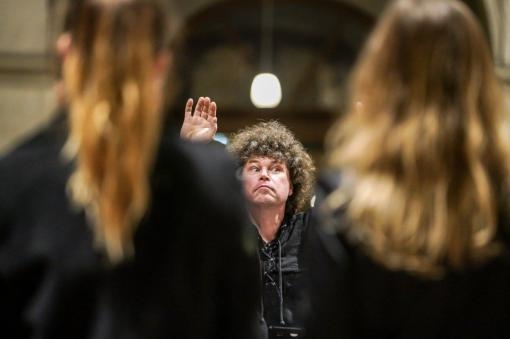The oratorio St John Passion by the composer Johann Sebastian Bach is one of the indisputable jewels of the world’s music literature. Many conductors try to surprise the audience with a new, fresh, energetic and expressively rich conception of the composer's music. Among the bodies willingly accepting this difficult challenge is the Czech Ensemble Baroque under the direction of conductor and artistic director Roman Válek. They gave their version of one of the most frequently performed of Bach's works on Good Friday in Brno’s Church of the Immaculate Conception of the Virgin Mary.
St John’s Passion brings out the most dramatic elements of Bach's music. Even in the powerful opening chorus they provoke the listener to awed humility. The suggestive charge and frequent changes in musical parts – the Evangelist’s recitatives, the arias of Jesus, Pilate and others, the short, punchy choruses of the crowd, graceful arching meditative choruses - all this ensures that despite the length of the work the music remains fresh and vivid. This diversity however showcases many musical factors that a conductor and performers must not forget, if they want to achieve the most authentic form. The Czech Ensemble Baroque has proved in the past that its interpretation is historically informed and vocally and orchestrally up to the job. However did it manage to use this orchestra to take into account all the elements of such a demanding and important work? Although there is no simple answer to most of these questions, here we can afford to make an exception. The answer is a clear yes. The Czech Ensemble Baroque prepared a true delicacy for early music lovers.
From the first bars of the iconic input choir Herr, unser Herrscher it was obvious that Roman Válek decided to interpret the sound of this work in an unusual way. What is usually a long cry and invocation of the Lord was replaced by a short, clipped, but equally dramatic address. This introduction made it quite clear to the audience that, although the Czech Ensemble Baroque honour and observe convention, they are not afraid of new sounds. In accordance with the interpretive tradition of this body here quite a fast pace was chosen, but one which perfectly resonated with the meaning of the work. Despite audible individuality of the voices of choir members they formed a single organic whole. In the relatively limited number of artists the characteristic features of voices necessarily stand out from the music score, but due to accurate work with dynamics however the chorus remained uniform and musical communication full and colourful.
A significant portion of Bach's oratorios use soloists and their number is directly proportional to the length of the performance. Often the threat is that although most singers honour their qualities, a fault appears for example in the character of Peter, Pilate, Jesus or God forbid directly in the Evangelist. It is not just about intonation or authentic historical performance; a performance may fail through lax expression, lack of technology or operatic mannerisms. The Czech Ensemble Baroque knows that with their reputation this would not be acceptable. And all the soloists - and I stress this - lived up to the high expectations placed on them by Válek. The expression was in most cases be refined in absolute detail, the soloists knew what they were singing, and the result showed it. Every word that could be highlighted or decorated made its way to the ears of listeners. The excellent first tenor aria from Jaroslav Březina can serve as an example. Peter, after he denies Jesus for the third time to the servant of the high priest, regrets his deeds and berates himself in an intense aria. Brezina made audible his disgust by singing just that word "servant". Michal Marhold also gave Pilate a human depth and believable behaviour - from his sovereign majesty Pilate says to the Jews that he sees nothing wrong in Jesus with solid certainty confidence and a sense of superiority. When in response to their complaints about the designation of Jesus as King of the Jews he replied: "What I wrote, I wrote," it was clear from Marhold’s speech that further resistance would have dire consequences. Mainly due to the soloists the characters came alive and their emotions and motivations were acted in an entirely believable manner. Jesus was performed with no less quality by Roman Hoza, graciously accepting his fate. The delicate scene at the Cross, in which Jesus says to his mother: "Woman, behold your son," kept the audience engrossed in silence. At this point Hoza’s interpretation reached its peak.
The brightest figure in the oratorio however is the evangelist himself. James Kubin, who took on this difficult role showing lightness, properly chosen dynamics, intonation and confidently full expression and highlighting the wide range of emotion that is typical for a Bach oratorio. Attention should also be paid to the consistent changes in the diction of the more melodious parts of this musical work - usually the text citations or the inscription on the cross. All the singers deserve praise for fully measured, informed and appropriate use of vibrato.
The orchestra successfully captured this masterpiece without faults aside from a slight faltering in the intonation of the cello. Here it is also in place to compliment the successful monitoring of internal consistency of the work. It could be heard that Roman Válek devotes special attention to this. And it was here that the Czech Ensemble Baroque and Johann Sebastian Bach in the Brno performance most demonstrated the power of musical communication.
- S. Bach Passio Secundum Johannem, BWV 245
Evangelist: Jakub Kubín
Jesus: Roman Hoza
Pilate: Michal Marhold
Peter: Tadeáš Hoza
Maid, Servant: Markéta Böhmová, Tomáš Kočan
Soprano: Lenka Cafourková Ďuricová and Romana Kružíková
Alto: Monika Jägerová
Tenor: Jaroslav Březina
Leader: Petr Zajíček
Choirmaster: Tereza Válková
Conductor: Roman Válek
Church of the Immaculate Conception of the Virgin Mary
































No comment added yet..